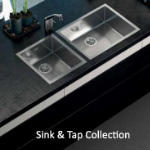How to Pick the Perfect Kitchen Sink
Choosing the right kitchen sink can be overwhelming with so many options available in the market. It’s an important decision that can affect the overall look and functionality of your kitchen. In this article, we’ll guide you through the essential factors to consider when picking the perfect kitchen sink that meets your needs and suits your style. We have also got an extensive range of kitchen sinks and kitchen taps to choose from.
Understanding Your Kitchen Layout
Before selecting a sink, it’s crucial to assess your kitchen layout to determine the best fit. Consider the available space, countertop dimensions, and the cabinet size. Measure the sink area to ensure that the sink fits in the allotted space without any overhang or under hang.
Types of Kitchen Sinks
There are various types of kitchen sinks to choose from, such as inset, under-mount, farmhouse lay-on, inset and undermount kitchen sink.
Each type has its unique features and installation process. Top-mount sinks are the most common and affordable option, while under-mount sinks offer a seamless countertop look. Farmhouse sinks have a rustic appeal, and integrated sinks are becoming popular for their modern look.
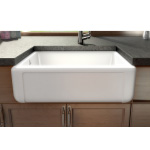
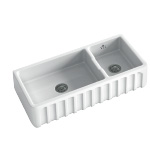
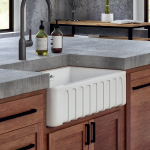
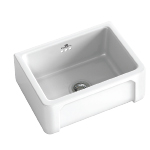
Sink Materials
Kitchen sinks are available in different materials, each with its pros and cons. Stainless steel is durable and easy to clean, ceramic kitchen sinks are attractive and offer a classic look. Composite granite sinks are a blend of materials that provide a unique look and durability. Granite kitchen sinks are heavy-duty and long-lasting, but they require regular maintenance. We will also be stocking a new range of fibre composite sinks which are becoming very popular due to a number of advantages that they have over pure granite sinks as they are heat resistant, scratch resistant and stain resistant. They are also very durable.
Number of Basins
The number of basins in a sink determines its functionality. Single-basin sinks are perfect for washing large pots and pans, while double-basin sinks allow for multitasking. Triple-basin sinks are ideal for those who want a separate area for food preparation.
Sink Depth
The depth of a sink also affects its functionality. Shallow sinks are perfect for washing dishes, while deeper sinks can accommodate larger items. Consider the height of the sink when selecting the depth, ensuring that it’s comfortable to use and doesn’t cause any strain on your back.
Tap Compatibility
The tap you choose should match the sink you select. Consider the number of holes in the sink for the tap installation, and ensure that the tap height complements the sink depth. Also, determine the tap reach to ensure that it reaches all areas of the sink. Also water pressure is a consideration, and you should check this with your installer.
Maintenance and Durability
Your kitchen sink should be durable and easy to maintain. Choose a material that’s resistant to scratches, stains, and rust. Consider the warranty offered by the manufacturer to ensure that your investment is protected.
Left Handed or Right Handed Drainer
To make life easier, if you are like me and are left handed, order a right handed drainer! If you are right handed order a left handed drainer.
Budget
Your budget is a crucial factor when choosing a kitchen sink. The cost varies depending on the type, material, and size of the sink. Determine the maximum amount you’re willing to spend and look for options that fit your budget without compromising on quality.
Sink Accessories
Sink accessories can enhance the functionality of your kitchen sink. Consider adding a waste disposal unit, soap dispenser, and cutting board to make your sink more versatile and convenient.
Installation Process
The installation process of a sink depends on its type and material. Inset sinks are easier to install than under-mount sinks, while farmhouse sinks require additional support. Consider hiring a professional plumber to ensure that the sink is installed correctly and efficiently.
Matching Your Style
Your kitchen sink should complement your kitchen’s style and overall decor. Choose a kitchen sink that matches your kitchen cabinets, countertops, and backsplash. Consider the colour and texture of the sink to ensure that it blends seamlessly with the rest of the kitchen.
Environmental Factors
Consider the environmental impact of the sink you choose. Some materials, such as stainless steel, are recyclable and eco-friendly. Composite sinks are made from recycled materials, making them an eco-conscious choice.
Cleaning and Maintenance Tip
For deeper cleaning, use a mixture of baking soda and water to scrub the sink gently. Avoid leaving acidic or harsh chemicals in the sink for an extended period, as this can cause damage.
Conclusion
Choosing the perfect kitchen sink can be a challenging task, but with careful consideration of the factors outlined in this article, you can find the one that meets your needs and suits your style. Remember to assess your kitchen layout, choose the right sink type and material, consider the number of basins and sink depth, ensure kitchen tap compatibility, and factor in maintenance, budget, and environmental impact. With these tips, you can enjoy a beautiful and functional kitchen sink that lasts for years to come. Download our latest Kitchen sink and Kitchen tap brochure here.
FAQs
- What’s the most popular type of kitchen sink?
- Top-mount sinks are the most popular due to their affordability and ease of installation.
- Which sink material is the most durable?
- Stainless steel is the most durable and easy to maintain sink material.
- Can I install a kitchen sink by myself?
- If you have the necessary plumbing skills and experience, you can install a kitchen sink yourself. However, it’s recommended to hire a professional plumber for a seamless installation.
- What’s the average lifespan of a kitchen sink?
- The average lifespan of a kitchen sink varies depending on the material and maintenance. A high-quality sink can last for over 15 years with proper care.
- How can I prevent water spots and stains on my sink?
- Rinse your sink after each use and wipe it dry to prevent water spots and stains. Avoid leaving acidic or harsh chemicals in the sink for an extended period, as this can cause damage to the kitchen sink.

